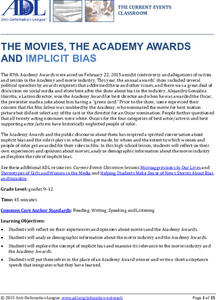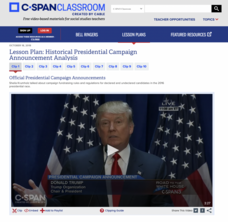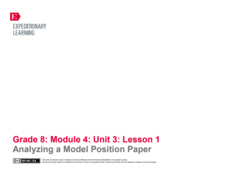Building Evidence-Based Arguments: Grade 9
New ReviewHigh schoolers investigate the dilemma of a proportional response with a lesson about the history of terrorism and militant extremists in the United States. As they examine memos from the FBI and speeches from President Bush and Obama,...
University of North Carolina
The Narrative of the Life of Frederick Douglass, an American Slave
After reading excerpts from Frederick Douglass' autobiography, pupils will draw on what they've learned about the cruelty of slavery to write and present an anti-slavery speech or editorial.
Anti-Defamation League
The Movies, the Academy Awards and Implicit Bias
"And the award goes to. . . " High schoolers investigate bias in the movie industry by reading articles, watching a short video, and examining data about the Academy of Motion Picture Arts and Sciences (AMPAS) membership, nominees, and...
C3 Teachers
Uncle Tom’s Cabin: Can Words Lead to War?
"Words, words, words." Despite Hamlet's opinion, words can be significant. In this inquiry lesson, middle schoolers learn how the words in Harriet Beecher Stowe's Uncle Tom's Cabin, in the view of many, lead to the American Civil War. To...
K20 LEARN
The War of the Words: Grammar and Parts of Speech
Here's a activity that adds some zip to a study of parts of speech. Class members read two versions of the same article, one loaded with evocative nouns, verbs, adjectives, and adverbs, while the other is missing this sensory language....
K20 LEARN
Speak Up! Four Categories Of Speeches
High schoolers examine the four major types of speeches: informative, demonstrative, persuasive, and extemporaneous. Groups then select one type and craft and share a presentation highlighting this format's characteristics. Finally,...
K20 LEARN
Trigger Warnings - Intellectual Rights and Responsibilities: Banned Books, Censorship Part 1
"Warning: Conducting this lesson may be harmful." Such statements, called "Trigger Warnings," are the focus of a two-part lesson that looks at censorship, especially the pros and cons of trigger warnings. Class members read two articles,...
Curated OER
Putting it Together: Analyzing and Producing Persuasive Text
Young orators demonstrate what they have learned about persuasion and persuasive devices throughout the unit by analyzing a persuasive speech and then crafting their persuasive essays. Class members engage in a role-play exercise, use...
Franklin D. Roosevelt Presidential Library & Museum
Pearl Harbor Activity #2: Why Do Words Matter?
Words matter! That's the big idea behind an activity that asks scholars to replace words in FDR's "Day of Infamy" speech with synonyms. They then listen to a recording of President Roosevelt's address and compare his version to their own.
Franklin D. Roosevelt Presidential Library & Museum
Pearl Harbor Activity #1: Newspaper or Radio Account
After listening to President Franklin D. Roosevelt's "Day of Infamy" speech, young historians research information about the Japanese attack on Pearl Harbor, possible motives for the attack, and the consequences of the attack. Scholars...
Facing History and Ourselves
The Audacity of a Vote: Susan B. Anthony’s Arrest
Susan B. Anthony's speech "Is It a Crime for Women to Vote?" takes center stage in a instructional activity that asks class members to consider how they might respond to what they consider an unjust law. Groups work through the speech...
C-SPAN
Should States Shift to Mail-In Voting during the Coronavirus Pandemic?
With the coronavirus pausing many norms in American society, officials are trying to decide how to safely hold voting in the 2020 presidential election. Using curated video clips, including speeches from Congress, journalists, and...
C-SPAN
Historical Presidential Campaign Announcement Analysis
Using the announcements of presidential candidacies, pupils consider how contenders make their initial arguments to the public. A worksheet helps structure collaborative work to analyze 10 video clips. Writing prompts allow for extension...
EngageNY
Analyzing a Model Position Paper
What's the difference between a position speech and a position paper? Scholars use a rubric to analyze a model essay about Michael Pollan's food chains to understand what makes them unique. Additionally, pupils create anchor charts...
Literacy Design Collaborative
The Art of Persuasion: How Rhetorical Devices Influence Audiences
Scholars analyze a variety of text to identify the development of claims and persuasive techniques writers use. In each text, pupils determine the argument and the persuasive techniques and complete a task introduction worksheet. The...
University of North Carolina
Speeches
A handout on speeches, part of a series on specific writing assignments, helps individuals develop their speech-writing skills. The resource starts with a discussion on audience and purpose and ends with tips to engage the audience.
Birmingham City Schools
Stick to the Point: Getting It Right with Constructed Responses
Practice writing constructed responses with a 26-slide presentation. Developed to guide scholars through the appropriate steps, the resource assists them in providing a well-considered answer.
Constitutional Rights Foundation
Sam Houston: A Study in Leadership
Learners read a short excerpt from a speech by Sam Houston and answer corresponding questions as well as engage in additional activities, including writing a persuasive essay and discussing topics in small groups. The resource helps lay...
Trinity University
Julius Caesar: The Power of Persuasion
"Friend, Romans, countrymen, lend me your ears..." Those words begin one of the most persuasive speeches in literature. Explore the elements of persuasion in a series of lessons related to William Shakespeare's Julius Caesar. In addition...
CK-12 Foundation
Commonsense Composition
Any teacher with common sense should use the perfect resource to improve composition skills. Perfect for flipped lessons and station rotation, the text details information about genres of writing with guiding questions for readers....
Heritage Foundation
The Amendment Process and the Bill of Rights
Did you know that lawmakers have proposed more than 5,000 bills to amend the US Constitution in Congress? Your class learns intriguing facts about the process of choosing amendments. A variety of activities including before and after...
National Endowment for the Humanities
A Debate Against Slavery
Slavery is a serious topic that can be challenging for middle schoolers to study. Young scholars can see firsthand through primary sources what occurred during that time period in the United States. The third of five lessons provides...
ReadWriteThink
Analyzing Famous Speeches as Arguments
A speaker, a message, an audience. After analyzing these elements in Queen Elizabeth's speech to the troops at Tilbury, groups analyze how other speakers use an awareness of events, and their audience to craft their arguments....
PBS
Stories of Painkiller Addiction: Learning About Opioids
Feeling high is not the only side effect of abusing prescription opioids. Middle and high schoolers learn more about specific painkillers, including Fentanyl, Oxycodone, and Clonazepam, as well as their common brand names and extensive...

























